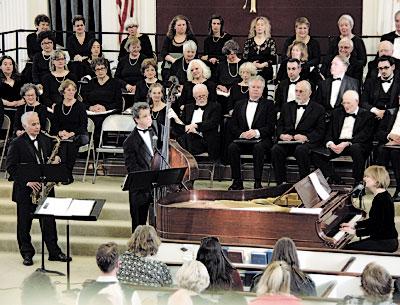Opinion: Pleasure for the Ear and the Heart

The spring program presented Sunday by the Choral Society of the Hamptons at the East Hampton Presbyterian Church was an engaging and enjoyable study in intimacy and nuance. What at first appeared as a strange collection of repertoire proved very effective in reminding the listener of how beautiful even the simplest parts of life can be under the proper lens.
The concert opened with selections from “Frostiana,” Randall Thompson’s 1959 setting of seven poems by Robert Frost. Thompson’s music, in conscious emulation of Frost’s poetry, allows the performer and listener to find the beauty that even the simplest idea or activity may contain when examined lovingly. The frequent unison passages and straightforward rhythms have led some conductors to deem this music “accessible” (ugh!) to high school or non-select college choirs, resulting in more than a few wretched, plodding renditions over the years. On Sunday, however, the Choral Society bore out the beliefs of the poet and composer, proving that the simple can be profoundly beautiful.
“The Road Not Taken” is perhaps the most famous of Frost’s poems and provides the text for the opening of “Frostiana.” While clearly articulating the words, the chorus sang beautifully flowing phrases with a thrilling execution of dynamic contrasts led with elegance and precision by Jennifer Scott Miceli, the society’s guest conductor. Her gestures struck a perfect balance between clarity and expressivity, with no motion wasted.
In “The Pasture,” the tone, balance, and blend of the tenors and basses as they alternated between unison and three-part textures were delightful. In fact, they made a compelling case for joining them in their care of the pasture and the baby calf. “A Girl’s Garden” featured the sopranos and altos, who handled the twin challenges of crisp articulation and lively storytelling admirably, and also produced a lovely unison sound.
“Choose Something Like a Star” is the final movement in “Frostiana,” and is scored for soprano, alto, tenor, and bass. Despite a few passages where the altos were a bit under pitch, the movement provided an inspiring finish to the first portion of the program. The chorus showed off its dynamic range and discipline, managing the gradual increase of energy that builds the piece to its climax. The sopranos should be especially recognized for their unity of tone and expressivity over many extended repetitions of the words “O Star!” Arielle Levioff’s expert, nuanced performance at the piano was a perfect complement. The piano parts are an integral part of the Thompson compositions, and Ms. Levioff’s playing showed keen awareness of the piano’s shifting role.
Next followed a sensitive presentation of Eric Whitacre’s “Five Hebrew Love Songs,” with Juliane Klopotic’s finesse at the violin and Sharon Pesenti’s inspired reading of the Hebrew texts providing perfect complements to the singers’ earnest and expressive delivery. The texts for these songs were written by Hila Plitmann, whom Mr. Whitacre would later marry, and each one of these charming pieces distills a moment shared by the two young musicians. The chorus handled the rhythmic and harmonic challenges with great dexterity, and the warmth of their tone invited the listener to be part of a delicate and intimate experience.
The next segment featured another talented husband and wife team, Jane Hastay and Peter Weiss. They performed three jazz standards on piano and upright bass. With 21 years’ experience making music together, it is not surprising that you can almost see the thoughts passing back and forth between them as they play and sing. Many residents here probably have heard these artists while dining or socializing, but the concert setting provided an opportunity to listen more closely to their beautiful tone and skilled improvisation. Richard Scollo’s stylings on the alto sax added another layer of beauty and interest.
The final piece of the afternoon was Robert Chilcott’s “A Little Jazz Mass.” Mr. Chilcott employs a variety of jazz styles in his setting of the Ordinary of the Mass, while also honoring other techniques such as counterpoint and thematic development. The piece requires singers to navigate some pretty tricky syncopations and tune extended harmonies, both of which can lie outside of the typical choral singer’s comfort zone. The Choral Society not only handled these challenges but delivered impeccable Latin diction. The sound of the group succeeded in embracing the variety of moods inherent in the text as well as the diverse grooves in the music. Sean Fitzpatrick confidently established and nurtured each new feel at the piano, with excellent help from Mike Hall on bass and Ellis Holmes on percussion.
Each element of Sunday’s concert was carefully prepared and affectionately performed, and the Choral Society of the Hamptons deserves congratulations for a performance that brought pleasure to the ear and heart.
Adam Judd is a member of the faculty of the Ross School in East Hampton. This is his first review for The Star.
